
From left to right: Gelmy de los Angeles May May, Glendy del Rosario May May and María Estela May Cobá help UBC Okanagan student Courtney Fitzpatrick make encamisados (a tortilla stuffed with egg).
AS THE FLIGHT BEGINS ITS DESCENT INTO MEXICO’S Yucatán state, the intense humidity enveloping the plane was the first sign the group of 15 students weren’t in British Columbia anymore.
“The piercing heat and humidity was an interesting mix I’ve never felt before,” laughs Noah Chenoweth, a doctoral student and member of the Upper Nicola Band of the Syilx Okanagan Nation in Merritt, BC.
But the climate wasn’t the only thing Chenoweth and his classmates had to adapt to; as part of an international exchange offered by UBC Okanagan’s Global Engagement Office, the group of 15 students from various fields of study were on an immersive three-week experience of Mayan language and culture.
View this post on Instagram
As one of the Indigenous peoples of Mesoamerica, the Maya civilization was predominantly centred in Mexico’s Yucatán peninsula until the arrival of the Spanish in the 16th century. While Maya architecture and civilization was systemically destroyed over the ensuing centuries, the Maya people remained resilient, maintaining their rich language and traditions.
Today, it is estimated there are eight million Maya living in Mesoamerica—likely as many as there were at the time of conquest. The Mayan language is also being taught in schools—both within and outside of Mexico—as the movement towards revitalizing Indigenous languages grows globally.
In partnership with local linguists working on the revitalization and strengthening of Maya communities, students learned to converse in both Spanish and Mayan during the trip. They also visited sacred Maya archaeological sites across the peninsula to learn beyond the typical tourist perspective.
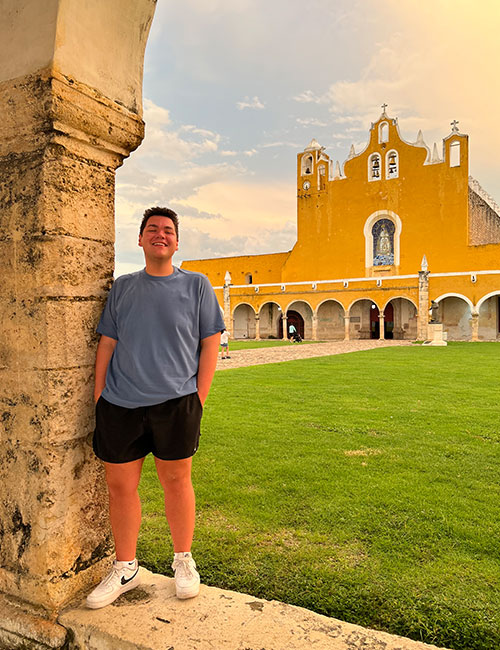
Noah Chenoweth at The Convent of San Antonio de Padua in Izamal. The building is one of the most important and majestic in Mesoamerica (Photo courtesy of Noah Chenoweth).
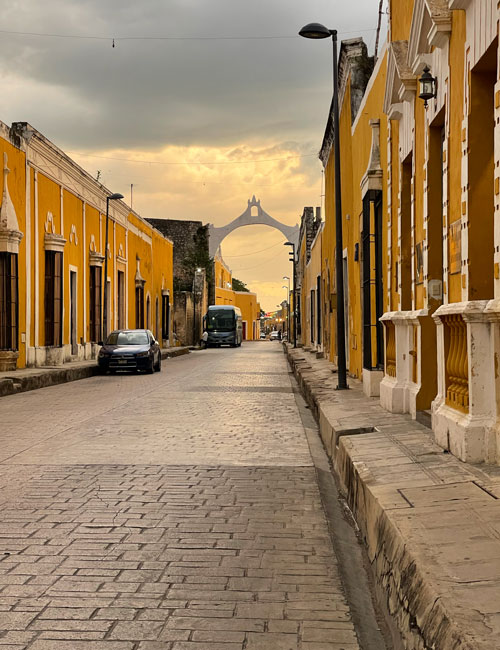
Izamal-Valladolid is known as Mexico’s “Yellow Town” because all the houses and buildings are painted yellow. Pictured here is 31st street (Photo courtesy of Dr. Monica Good).
But perhaps the most immersive and educational experiences came from time spent in San José Oriente, a wholly Mayan-speaking community the students visited weekly.
“We built relationships with the residents and spent time visiting them. The knowledge creation and transmission just happened from there,” explains UBC Okanagan undergraduate student Stephanie Anaka, a member of the Anishinaabe First Nations’ Ebb and Flow Nation in Manitoba.
In the community, students played soccer with local kids, learned how to make traditional Maya embroidery and cooked corn tortillas. Through these activities, they were able to begin speaking the Mayan language and communicate with their hosts.
Before leaving San José Oriente, the UBC students presented community members with materials for embroidery as a means of sustaining their future economy. It was also a thank you for allowing the students to enter the community and learn from them.
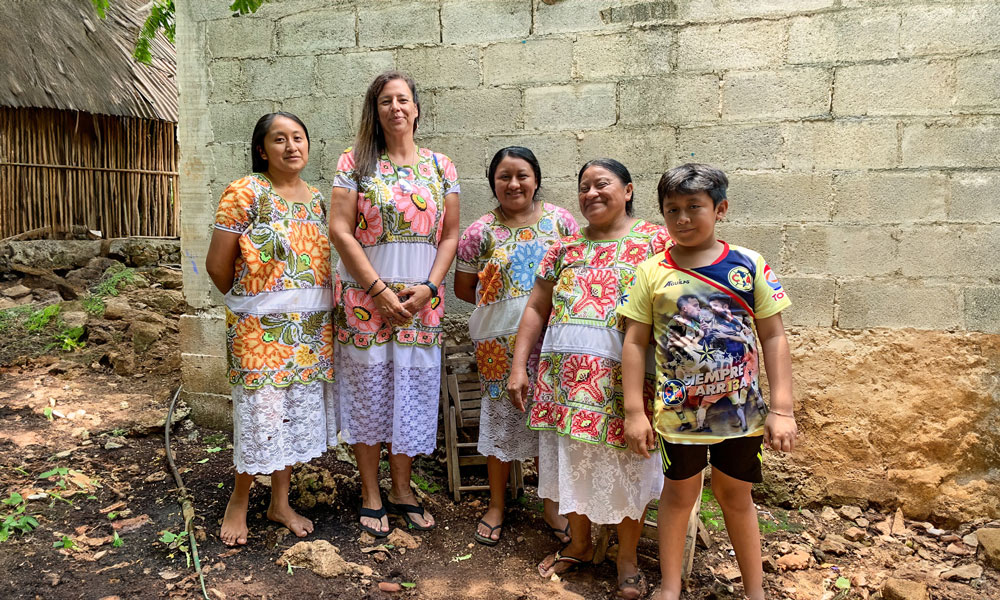
From left to right: Glendy del Rosario May May, UBCO student Stephanie Anaka, Gelmy de los Angeles May May, Maria Estela May Cobá and Geiser Jafet Pat May. Here they wear the traditional attire of Mayan women, consisting of a hipil (top) and justan (bottom). Depending on the complexity of the design, it can take anywhere from two to six months to craft such intricate clothing (Photo courtesy of Stephanie Anaka).
The benefits of international language exchanges
UBC Okanagan is the first university in Canada to offer this kind of immersive exchange program in a Maya community and only the second in North America. The UBC Okanagan exchange places special emphasis on Indigenous students so they can enrich their conversations around language in decolonization, resistance and Indigenous knowledges.
For Dr. Monica Good—who developed the Mayan exchange course and teaches in UBC Okanagan’s Faculty of Creative and Critical Studies—the trip was also an opportunity for students to have deeper conversations about how territory affects language and how language shapes everything around us.
“This was especially important for the Indigenous students attending, many of whom are trying to reclaim their language in their respective communities,” explains Dr. Good, who was born in the Mexican state of Coahuila and is one such individual trying to regain speaking her Mayan language.
“We’re losing speakers, like many Indigenous languages. We believe the future of the Mayan language—and any Indigenous language—lies with teaching youth and children.”
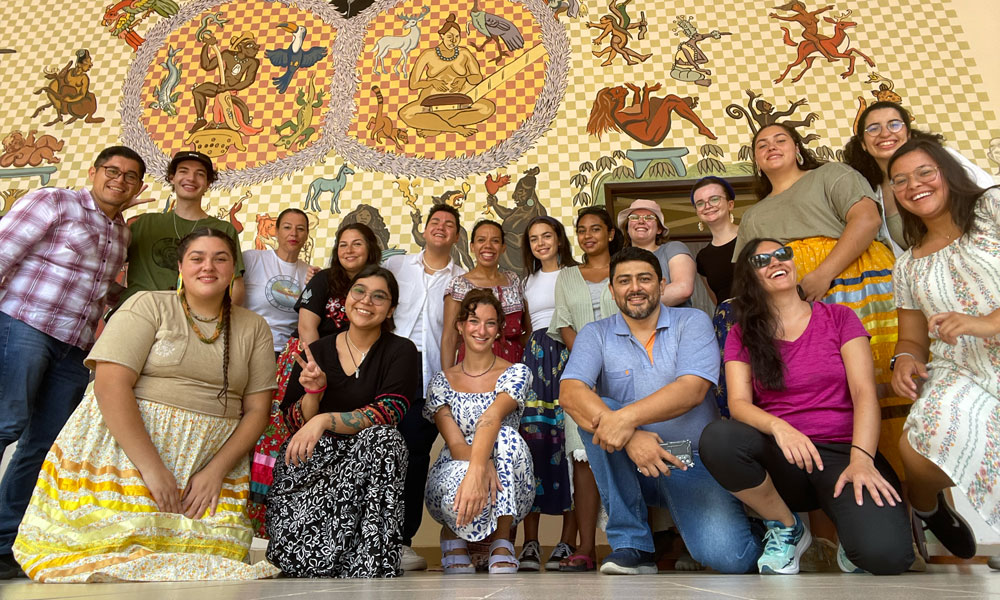
UBC students pose at CECIDHY (Centro Estatal de Capacitación, Investigación y Difusión Humanística de Yucatán), where their language classes took place. The mural in the background is known as Infinite Quetzals in the World of Deer by Oaxacan painter Shinzaburo Takeda Nagae. The mural makes reference to the coexistence of Mayan and Zapotec characters interspersed with animals from Yucatán and Oaxaca (Photo courtesy of Dr. Monica Good).
“If we can return to this notion that students can learn their language and connect to their territory, their traditional knowledge and their community, then hopefully they’ll embrace it and pass that on to future generations.”
Dr. Good adds that although the Mexican constitution recognizes the importance of Indigenous peoples and languages, it’s merely symbolic. Many communities have either lost their languages due to colonization, or have preserved them but are unable to receive social and health support from the government because they don’t speak the official national tongue of Spanish.
“Language holds everything,” says Chenoweth. “It helps stories pass between generations. It holds the laws, the jurisdiction over the land and identities—who you are as an Indigenous person.
“I think a major takeaway from this exchange was seeing how language is the centre of everything for Indigenous people, both in Canada and abroad.”
The success of the inaugural exchange has led to a future offering, which Dr. Good believes “helps UBC Okanagan fulfil the commitments it’s made to Indigenous communities. Both locally—by inviting Indigenous students—and overseas through our collaborations with Indigenous peoples also working on language revitalization.”
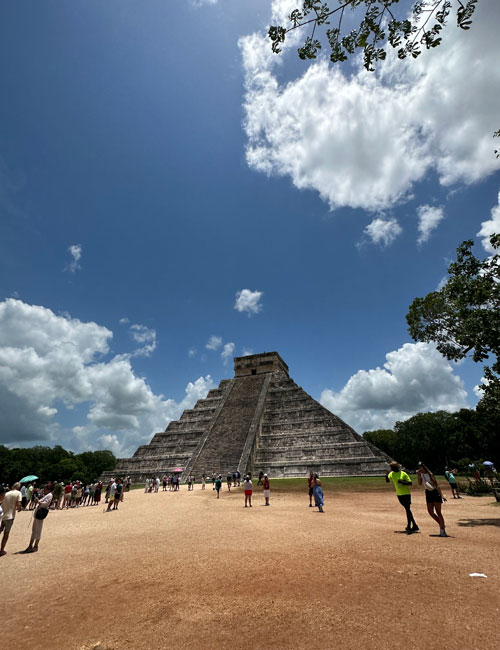
The Itzaes (people from Chichen Itzá) were the most important tribe in the area, given their lineage and prestige. Pictured here is the Temple of Kukulcán in Chichen Itzá (Photo courtesy of Courtney Fitzgerald).
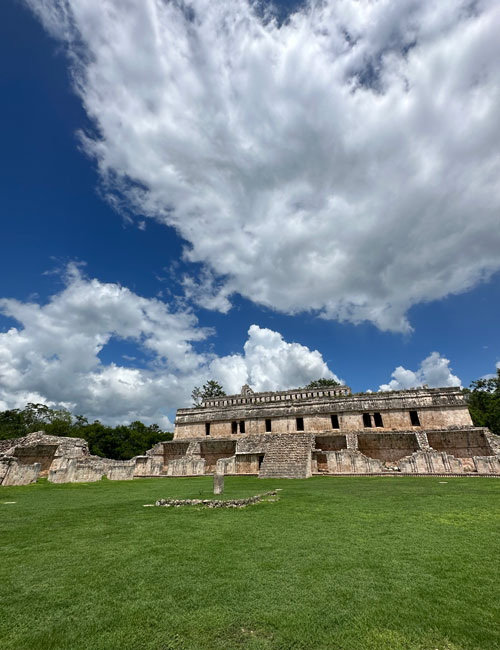
Kabah, or ‘the powerful hand,’ is the second largest ruin of the Puuc region. Pictured here is the Palace of the Masks (Codz Poop), featuring rich and intricate mosaics (Photo courtesy of Courtney Fitzgerald).
Heading home with lessons in hand
Upon her return to Canada, Anaka reflected on the impact of her experience in San José Oriente and decided to enrol in an Ojibwe language course.
“I feel more connected. I feel like the exchange opened a door in my personal life to be able to learn another language. It might be a slow process, but now I understand I can learn it.”
As for Chenoweth—who participated in several exchanges throughout his undergrad—he advises students to explore UBC Okanagan’s Go Global opportunities and apply for international exchanges if they’re able to.
“I’m a personal advocate for global exchanges because they’re an amazing opportunity to widen your perspective and grow your understanding of affairs happening around the world.
“This exchange, in particular, was beneficial for me as an Indigenous person because I was able to reflect on different experiences that happened around the world. And it’s almost like you’re looking into a mirror, learning and reflecting on what these Indigenous peoples are doing.
“It connected me to my Indigenous identity and Indigenous peoples half a continent away.”